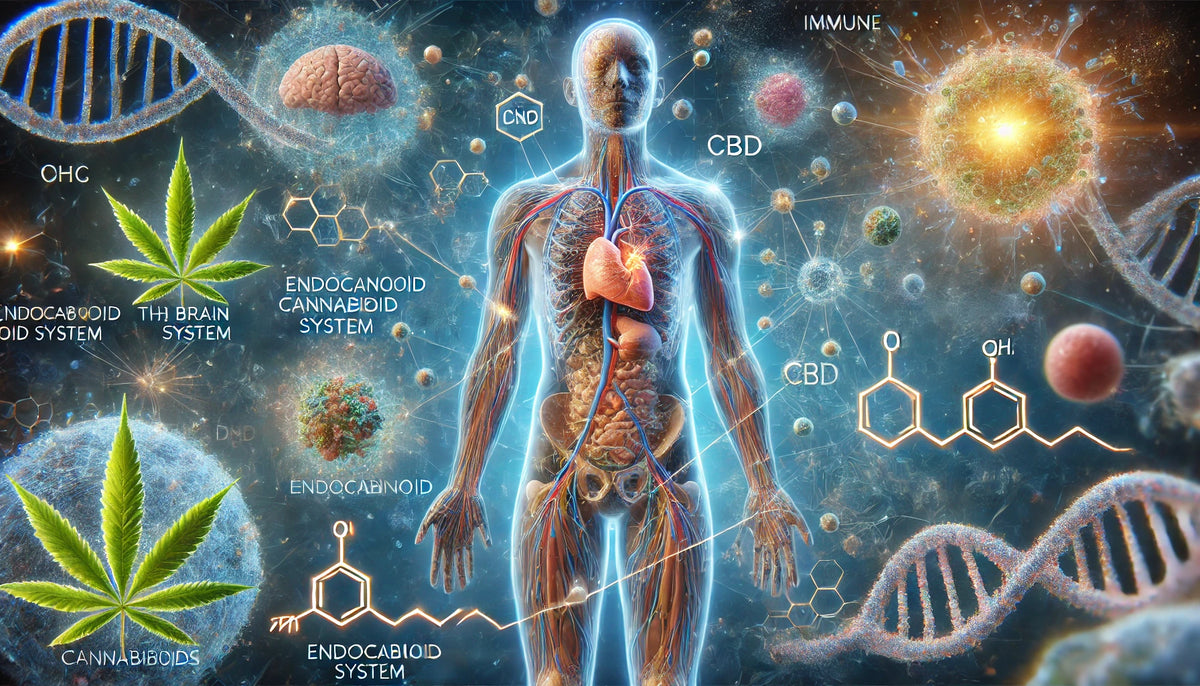
10% Discount on your First Order with the code WELCOME - FREE 48/72h DELIVERY in all UK, EU & Switzerland from €70.
Navigation
Menu
Role of cannabinoids in the human body
Listen to this article:
In this article, we will first explore cannabinoids and how they work in the endocannabinoid system. We will also study the role of cannabinoids in the human body, before revealing their potential medical benefits. Then, we will discuss the regulatory framework of CBD to conclude on future prospects.
Before delving into the precise role of cannabinoids in the human body, it is first crucial to establish a clear understanding of the exact nature of these compounds.
cannabinoids are a category of chemical constituents, both natural and synthetic, which interact with a specific network within our body called the endocannabinoid system. The latter has a significant impact on various bodily functions such as mood, appetite, pain management and even memory processes.

There are more than a hundred distinct cannabinoids derived from cannabis. Among these, two have been particularly studied: THC (tetrahydrocannabinol) and CBD (cannabidiol). The first is mainly linked to the psychoactive effects of cannabis while the second sees its notoriety growing thanks to its potential therapeutic virtues.
Note also that we produce our own cannabinoids - called endocannabinoids. These act as chemical messengers that facilitate exchanges between different cells in the body.
Contrary to preconceived ideas, cannabinoids are not only associated with cannabis but play an essential biological role for our daily well-being.
To address the issue of cannabinoids in our bodies, you first need to understand the endocannabinoid system . It is a complex network of receptors scattered throughout the body - brain, organs, connective tissues, glands and immune cells. Thanks to communication with these different parts of the human body via specific molecules called endocannabinoids , this system plays a crucial role in the regulation of various biological functions.
One of the main missions of the endocannabinoid system is to preserve biological balance or homeostasis within our body. Through their connection with CB1 and CB2 receptors dispersed throughout the body, cannabinoids influence a multitude of physiological processes ranging from sleep to pain, including mood and even appetite. This influence therefore allows the endocannaboide system to bring true internal harmony despite external fluctuations.
cannabinoids are thought to exert a notable influence on pain and inflammation. By connecting to the CB1 and CB2 receptors of the endocannabinoid system, these elements are able to modulate the pain signals that pass through the central nervous system. Additionally, their interaction with immune cells could attenuate inflammatory reactions, providing potential relief for those suffering from chronic inflammatory diseases.
We know that sleep is crucial to our overall health. Studies indicate that certain cannabinoids, notably CBD (cannabidiol), could be useful in regulating our sleep-wake cycles. They act by synchronizing our internal biological clock, thus promoting better nighttime rest.

It appears that cannabinoids may play an important role in managing stress and anxiety. By modulating neurotransmitter activity in key areas of the brain responsible for emotions like the prefrontal cortex and amygdala , they can help ease anxiety symptoms in some people.
cannabinoids, these active compounds present in cannabis, have undeniable medical potential. A 2018 study by the National Institutes of Health explored their position in treating persistent pain with encouraging results.
Legal and regulatory prohibitions on their use and study hinder the detailed study of the therapeutic potential of cannabinoids. However, as these barriers are removed, we look forward to discovering more about their potential medical benefits.
The old continent has diverse CBD regulations, which vary from one country to another. Within the European Union, cannabidiol is generally legal if its THC content does not exceed 0.2%. Trade and consumption of CBD derivatives are permitted under this condition.
The United Kingdom is adopting a more liberal policy towards CBD. Since 2021, the British authorities have authorized the sale of products containing less than 1% THC. These must be correctly labeled and cannot claim any medical benefit without scientific proof.
The situation in Canada is unique: here, CBD and cannabis in general have been legal since October 2018. Canadians have the opportunity to freely purchase and consume cannabis-derived products, including those enriched with CBD.
At the heart of scientific innovation, cannabinoids are opening new avenues for health and well-being. Research is developing globally to understand their unexplored therapeutic capabilities.

Preliminary studies suggest that these natural elements can have a significant impact in the treatment of neurodegenerative diseases such as Alzheimer's or Parkinson's. Their power to regulate the endocannabinoid system arouses the interest of researchers, a promising avenue against disorders of the human body.
At the same time, regulatory change could expand access to cannabinoids for everyone. Many countries recognize their medical usefulness and modify their legislation accordingly. It is therefore likely that in the short term, we will have more access to products enriched with cannabinoids.
It is exciting and intriguing to follow these scientific and regulatory advances. They have the capacity to improve our knowledge of the human body as well as our current medical practices. Although the road seems long, we mark our journey with hope and envision a future where we integrate cannabinoids into our daily health routine.
Submit your email to get updates on products and special promotions.